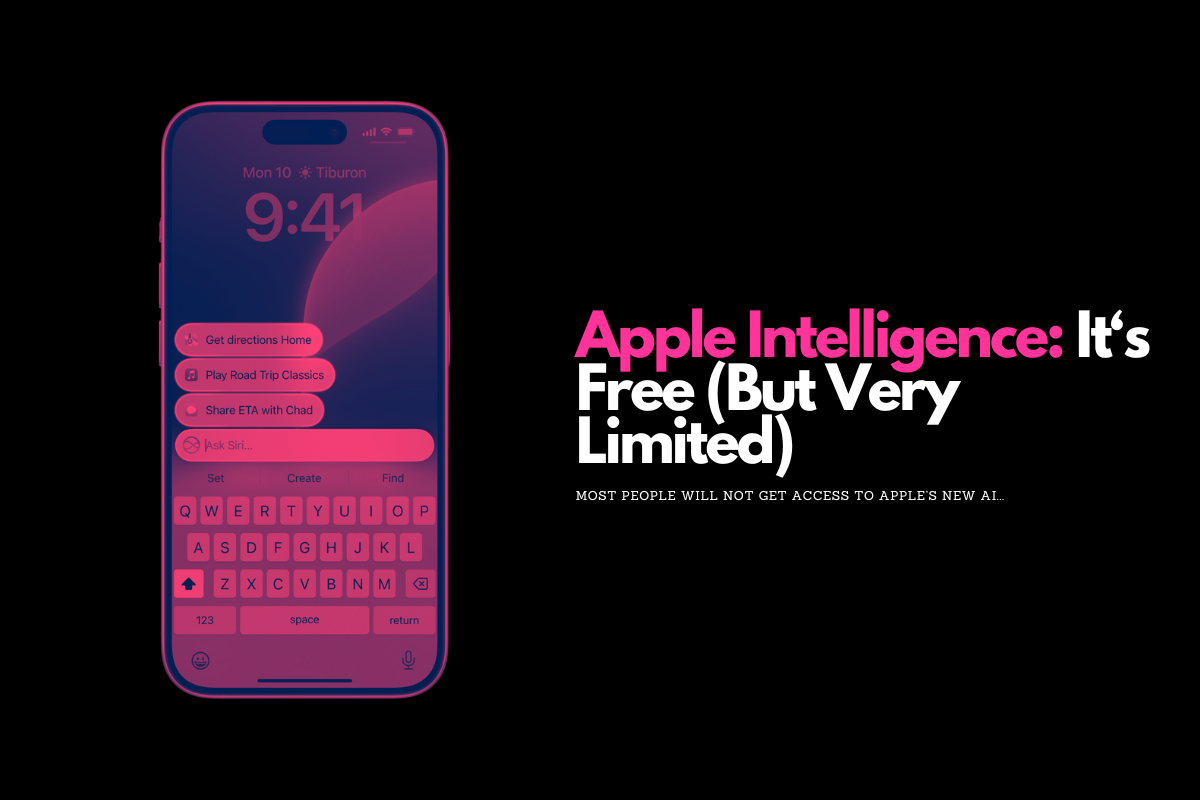Apple’s highly anticipated AI platform, Apple Intelligence, has been making waves since its announcement at WWDC 2024. But while it is free, very few users will actually get access to it
TL;DR
Is Apple Intelligence Free?
✅ Free for iOS 18 users
- Built into iOS 18
- No additional costs
📱 Limited to certain iPhones
- iPhone XS & later
- Requires A12 Bionic chip or newer
🚫 Restricted features for non-A17 Pro devices
- Advanced features only on iPhone 15 Pro & later
- Generative writing, personalized images, advanced video summarization
🔒 Privacy concerns with ChatGPT integration
- OpenAI’s past criticism for handling user data
- Apple won’t share data without permission
With its promise of revolutionizing the way we interact with our iPhones, many users are eager to know more about Apple Intelligence. One of the most pressing questions on everyone’s mind is whether Apple Intelligence is free.
The short answer is yes, but there are some limitations to consider.
Free for All iOS 18 Users
First and foremost, it’s important to note that Apple Intelligence is built into iOS 18, which means that it will be available to all users who update their iPhones to the latest operating system.
In other words, if your iPhone is compatible with iOS 18 (iPhone XS and later models), you’ll be able to access Apple Intelligence without any additional costs.
This is great news for iPhone users who want to experience the power of AI without having to pay for a separate subscription or service.
Apple’s decision to integrate Apple Intelligence into iOS 18 makes it accessible to a wide range of users, regardless of their budget.
Limited to Certain iPhone Models
However, there is a catch. While Apple Intelligence is free for all iOS 18 users, not all iPhone models will be able to take full advantage of its capabilities.
As mentioned earlier, Apple Intelligence will only be available on iPhone XS and later models. This means that if you have an older iPhone, such as an iPhone X or iPhone 8, you won’t be able to access Apple Intelligence, even if you update to iOS 18.
The reason for this limitation is that Apple Intelligence requires certain hardware capabilities that are only available on newer iPhone models.
Specifically, Apple Intelligence relies on the A12 Bionic chip or later to function properly. This means that older iPhones with A11 Bionic chips or earlier won’t be able to handle the processing power required for Apple Intelligence.
Restricted Features for Non-A17 Pro Devices
Even among the iPhone models that are compatible with Apple Intelligence, there are some limitations to consider.
While all iPhone XS and later models will be able to access basic Apple Intelligence features, such as enhanced Siri functionality and improved photo search, some of the more advanced features will be restricted to devices with the A17 Pro chip or later.
For example, features like generative writing tools, personalized image creation, and advanced video summarization will only be available on the iPhone 15 Pro and iPhone 15 Pro Max, as well as future iPhone models with A17 Pro chips or later.
This means that if you have an iPhone 13 or iPhone 14, you’ll be able to access some Apple Intelligence features, but not all of them.
The reason for this limitation is similar to the one mentioned earlier – advanced Apple Intelligence features require more processing power than older iPhone models can provide.
The A17 Pro chip is specifically designed to handle the complex AI tasks required for these features, which is why they’re limited to newer iPhone models.
Privacy Concerns with ChatGPT Integration
Another limitation to consider with Apple Intelligence is its integration with OpenAI’s ChatGPT. While this integration promises to bring even more advanced AI capabilities to iOS 18, it also raises some privacy concerns.
OpenAI has faced criticism in the past for its handling of user data, and some users are worried that integrating ChatGPT into iOS 18 could compromise their privacy.
Apple has stated that it will not share any user data with OpenAI without explicit permission, but some users may still be hesitant to use this feature.


